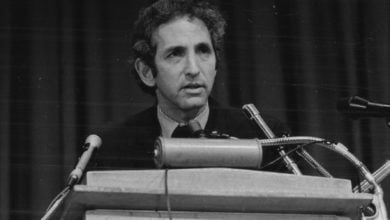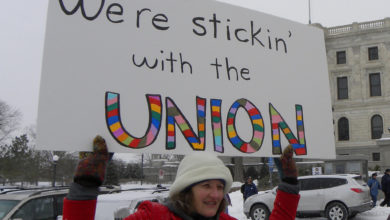Richard Holbrooke, civilian overseer of the U.S. war in Afghanistan
and Pakistan, died of a ruptured aorta on Dec. 13. A lifelong Democrat,
Holbrooke held positions in five Democratic administrations: Kennedy,
Johnson, Carter, Clinton and Obama.
Holbrooke is treated as a “giant” of U.S. diplomacy and described in
the most flattering terms by the U.S. government and the corporate-owned
media.
From the viewpoint of Marxism, war and diplomacy are not
viewed as opposites: one ending in violence and the other in peaceful
resolution. Diplomacy and war alike are tactics used in pursuit of class
interests. U.S. imperialism seeks to dominate the world on behalf of
U.S. capitalist corporations and banks. War and diplomacy use different
but parallel and interconnected methods to achieve the same objectives
for the ruling class of any society.
Holbrooke, the “diplomat,”
is thus appreciated by the imperialist establishment in the same way as
the most loyal military leaders. His unexpected death brought an end to a
criminal career in service to U.S. imperialism that spanned nearly a
half-century.
- Fresh out of Brown University in 1962, Holbrooke went to work for
the U.S. “Agency for International Development” and its “pacification
program” in Vietnam. USAID and the pacification program were integral
elements in the genocidal U.S. war against that country that left
millions dead and much of Vietnam destroyed. - As Assistant Secretary of State for East Asian and Pacific Affairs
during the Carter administration (1977-81), Holbrooke played a key role
in the arming of the Suharto military dictatorship in Indonesia. The
Indonesian military used those weapons to massacre more than a third of
the population of East Timor. Particularly murderous were the
U.S.-supplied A-10 Broncos widely used to strafe the population. - When the South Korean people rose up against U.S. occupation and its
puppet Chun Doo-Hwan in 1980, Holbrooke won the approval of President
Carter to release South Korean troops—then as now under U.S. control—to
carry out the Kwangju Massacre. More than 2,000 people were killed and
thousands more tortured and imprisoned in crushing the popular
rebellion. - Holbrooke was rewarded for his support of Bill Clinton’s successful
1992 presidential run by being appointed ambassador to the newly
reunified Germany two years later. Germany and the U.S. played the
biggest outside roles in the bloody destruction of Yugoslavia as a
multi-national state. In 1995, following the U.S.-organized “Operation
Storm” that expelled 200,000 Serbs from Croatia in a week, and a round
of NATO bombing of Serbian positions, Holbrooke orchestrated the Dayton
Accords ending the civil war in Bosnia. The final ceremony, organized by
Holbrooke, was held inside a hanger at Wright-Patterson Air Force Base
in the shadow of fighter-bombers intended to underline the threat of
renewed U.S. bombing. - The renewed—and much more intense—bombing came in 1999, the ten-week
U.S./NATO war against Yugoslavia. Holbrooke, then U.S. ambassador to
the United Nations, played a key part in the war and the events leading
up to it. The massive bombing targeted Yugoslavia’s infrastructure and
led to the final break-up of the country. Holbrooke is particularly
remembered for hailing the U.S. bombing of RTS-Serbian Radio and
Television in Belgrade, which killed 16 media workers. Today, there are
U.S. bases in all the former Yugoslav republics except Serbia. - Holbrooke campaigned in favor of the war and occupation in Iraq in
2003, as he had for the first Gulf War in 1991 and the invasion of
Afghanistan in 2001. Holbrooke called the Iraqi government “the most
dangerous in the world.” - As Special Envoy for Afghanistan and Pakistan in the Obama
administration, Holbrooke played a central role in the massive
escalation of the wars in both countries, and was in a Washington
meeting planning further escalation in Pakistan when he became
terminally ill.
As a loyal and useful servant of imperialism, Holbrooke was lionized
by government officials and the corporate media after his death. But for
much of the world, the only real regret is that he did not live long
enough to face justice at the hands of the countless victims of his
crimes





